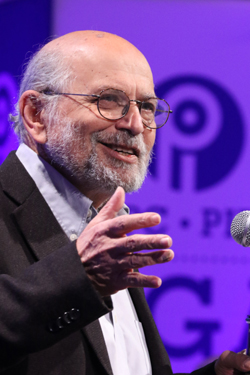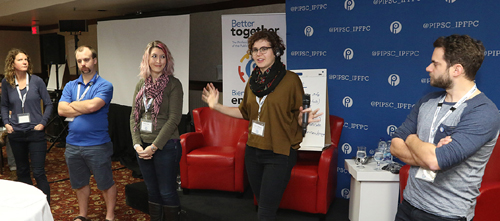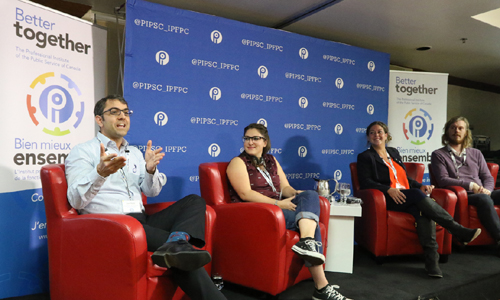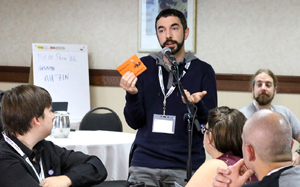President Debi Daviau delivered a vibrant bilingual address.
With a nod to the international study that concluded Canadians have the most effective public service in the world, the President commented, “I think we have one of the most effective unions, too!”
As evidence, President Daviau highlighted what PIPSC has accomplished in the past year:
- Together, we negotiated provisions to protect against the muzzling of scientists.
- Together, we secured collective agreement language to reduce the federal government's over-reliance on outsourcing.
- Together, we saved the federal sick leave system and created an opportunity for genuine negotiations on meaningful improvements.
There are other accomplishments to celebrate this year.
Yukon Hospital Corporation members secured their first negotiated agreement.
New Brunswick Crown Prosecutors are no longer the lowest-paid prosecutors in the country.
Members of the University of Ottawa Information Technology Professionals recently reached an agreement-in-principle with their employer, avoiding a strike.
Outside of the bargaining process, the Institute scored other victories.
Our longstanding call for more investments in the Canada Revenue Agency was heard in the federal budget.
We've made our voices heard in opposition to Bill C-27 and its threat to defined benefit pensions – one of the vital safeguards of middle-class incomes for retired workers.
A lot of these efforts and achievements are vital not just to our members but, as Alex Himelfarb has said, to “the common good”.
Our members, like most Canadians, don’t want us bogged down in small, inward-looking struggles. They want and need us to fight the bigger battles that benefit them and everyone.
The work we have done advocating public interest bargaining, fashioning common demands, and building solidarity among our groups has served our members – and Canadians – well.
More science and evidence-based public policy benefit everyone. So does a tax system that can tackle offshore tax havens. So does a government that hires full-time, permanent, unionized professionals.
Therefore, the model of collective action represented by our Strategic Bargaining Committee needs to continue. It needs to continue so that we can fight more effectively for our members on issues such as real job security, better sick leave, stronger pensions – and set a path that others in the country can also follow to win.
The Institute has continued to work hard to convince the government to invest more in Canada’s public service.
In our pre-budget consultation submission to the federal finance committee, we called on the government to do three things:
- restore Canada’s public science capacity
- reduce over-reliance on outsourcing of government services, and
- ensure the integrity of our tax system.
In October, the Institute organized lobby teams to deliver its messages directly to MPs on Parliament Hill.
The best public service in the world deserves far better than the Phoenix payroll system.
We have filed many grievances against the employer – our only legal means of pressuring the government to repair the system and properly compensate all our members who have been harmed or impacted.
The President has met with the ministerial working group responsible for fixing Phoenix.
Finally, on November 14, President Daviau held a press conference to challenge the government to abandon the Phoenix pay system and replace it with a new system that works – one that’s built by and for public servants.
We have the skills and resources – as union members, Canadians and public employees – to make a difference in our members’ and others’ lives.
Better Together is no longer just a slogan. It’s a promise – a measure – of our collective success. As our accomplishments of the past year and the challenges before us demonstrate, we all have a stake in ensuring we remain better together.
Full Text of the President’s address.





